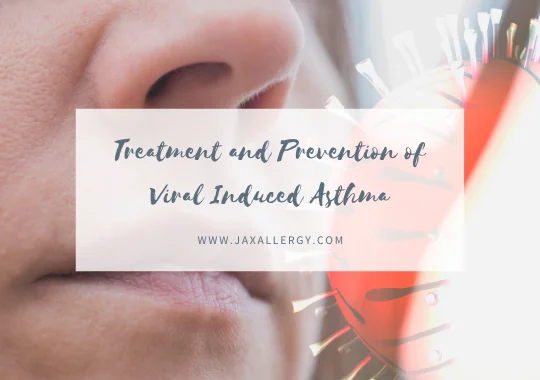Understanding Viral Asthma: Treatment and Prevention of Viral Induced Asthma

Updated Apr 2023 —
Cold and flu season is no fun for anyone, but it presents special challenges for those trying to manage their asthma. Although you don’t hear as much about it as other triggers, such as allergy and exercise, viruses are actually one of the most common triggers for asthma flare-ups.
As we again enter that time of year when colds and the flu are most likely, the risk of viral asthma also increases. The more you know about this type of asthma and about viral induced asthma in children and toddlers, the better prepared you’ll be to take care of yourself and your kids.
Symptoms of Viral Asthma
Viral-induced asthma flares are a big problem for those who have asthma. This is true for both children and adults, and can occur regardless if the asthma sufferers are symptomatic or free of asthma symptoms at the time when they contract the virus. Some of the most common symptoms associated with viral asthma include abrupt onset of:
- Coughing
- Wheezing
- Shortness of breath
- A feeling of tightness in the chest
Of course, these symptoms are common to other types of asthma as well, including asthma triggered by allergens and other irritants.
When asthma is viral-induced, it will often be accompanied by other symptoms. These may include:
- Stuffy or runny nose
- Fever or chills
- Headache
- Sneezing
- Fatigue
- Sinus pain
It can be difficult to sort out the asthma-related symptoms from the symptoms of the virus that triggered the flare-up. If you know that you suffer from asthma, it’s especially important to pay close attention to your body and to treat asthma flare-ups as well as the underlying virus.
Asthma After a Cold
It’s also important to note that a viral infection can also trigger adult-onset asthma. Unlike the episodes described above, in which an asthma sufferer catches a cold or the flu or some other virus and that virus kicks off an asthma flare-up, adult-onset asthma may come as a surprise. Asthma symptoms may appear for the first time, or may recur in a person who suffered from asthma as a child but has not experienced symptoms in many years.
Asthma Danger Signs
Some less common asthma symptoms are a signal that you should immediately seek medical attention. Some of these include:
- Extreme shortness of breath (such as having difficulty walking or talking)
- Low peak flow readings
- Flaring of nostrils
- Quick-acting inhalers not working
- Straining chest muscles to breathe
Asthma can be serious and even fatal, so err on the side of caution. If you’re experiencing symptoms that you’re uncertain about, contact your physician or call 911.
Protecting against Viral Asthma
While you may not be able to avoid viruses completely, you can minimize your risk–both of contracting a virus and of triggering an asthma flare-up if you do get sick. This requires a two-part approach.
Follow Your Asthma Action Plan
Asthma control and maintenance differs greatly from one person to another. Some asthmatics rarely have symptoms, and take a few simple precautions like keeping a rescue inhaler on hand. Others have more serious or frequent symptoms, and may have a detailed plan that involves regular medication and planned adjustments during flare-ups.
Of course, following your plan is always important. But, it’s all the more critical when the risk of triggers is higher.
If you don’t have a plan, talk with a doctor as soon as possible to ensure that you have clear steps mapped out to help manage your asthma and respond appropriately when you encounter triggers or suffer more serious asthma attacks.
Avoiding Viral Infection
Most of us are already following precautions that will help avoid viral infection, since the same steps that minimize the risk of catching Covid-19 also help reduce the risk of coming down with a cold, the flu, or another virus. These include frequently washing your hands, avoiding touching your face, and wearing a mask when you can’t maintain a safe distance from other people. You’ll also want to avoid contact with people you know to be sick, though this provides greater protection from some viruses than others. Different viruses are also transmitted differently, so it’s also wise to avoid sharing drinks with others,
Most people will also want to get a flu shot. Check with your doctor if you’re in doubt about whether or not you should get the flu vaccine. The vaccine is typically recommended, particularly for older people and those at high risk for complications with the flu. This year, most doctors are advocating for the flu vaccine even more strongly. With coronavirus still making the rounds and many experts expecting numbers to climb again as the weather gets colder and people move indoors, it’s more important than ever to protect your health.
The last thing you need is to contract the flu and Covid-19, and if you do get sick you may not be able to tell which you’re suffering from. There’s no vaccine for Covid-19 yet, so most people will benefit from taking other risks, such as the flu, out of the mix. That includes getting a pneumococcal vaccine or booster–a vaccination that helps protect against a certain form of pneumonia.
Viral Asthma and Coronavirus
Of course, the concerns asthma sufferers confront every fall and winter are magnified this year due to the risk of Covid-19. The coronavirus pandemic is of special concern to those with asthma for a few reasons, including:
- A person with asthma may be at greater risk for getting seriously ill if they contract Covid-19
- Another fast-spreading virus in the mix during cold and flu season increases the chances of catching something that may aggravate asthma
- Asthma sufferers with respiratory symptoms may have a difficult time discerning whether they’re sick with a virus or simply experiencing a flare-up
That means it’s all the more important for someone who has been diagnosed with asthma to take precautions to avoid Covid-19 and to get tested as soon as possible if Covid-like symptoms appear.
Treatment of the Underlying Virus
While avoiding viral infection is best, sometimes even the most careful people get sick. When that happens, it’s important that you take steps to protect your health and give your body the best opportunity to fight off the virus. For example:
- Make sure you’re getting enough sleep
- Stay well hydrated
- Ask your doctor whether you should be taking medication such as an antiviral
- Monitor your peak flow
The Right Medical Care Can Make All the Difference
We would all prefer to avoid colds and flus, let alone more serious viruses like Covid-19. Staying as healthy as possible is even more important when you have asthma and any viral infection could trigger a flare-up.
Protecting your health begins with reliable information, advice, and perhaps medication from a physician experienced in managing asthma and minimizing the impact of potential triggers such as viral infections and allergies. The physicians and staff at Allergy & Asthma Specialists of North Florida have extensive experience helping asthma sufferers. We offer four convenient locations around Jacksonville, and can usually offer same-day or next-day appointments.
If you’re ready to get the help you need to stay healthy with asthma, call (904) 730-4870 or use our convenient online email form to schedule your appointment right now.

